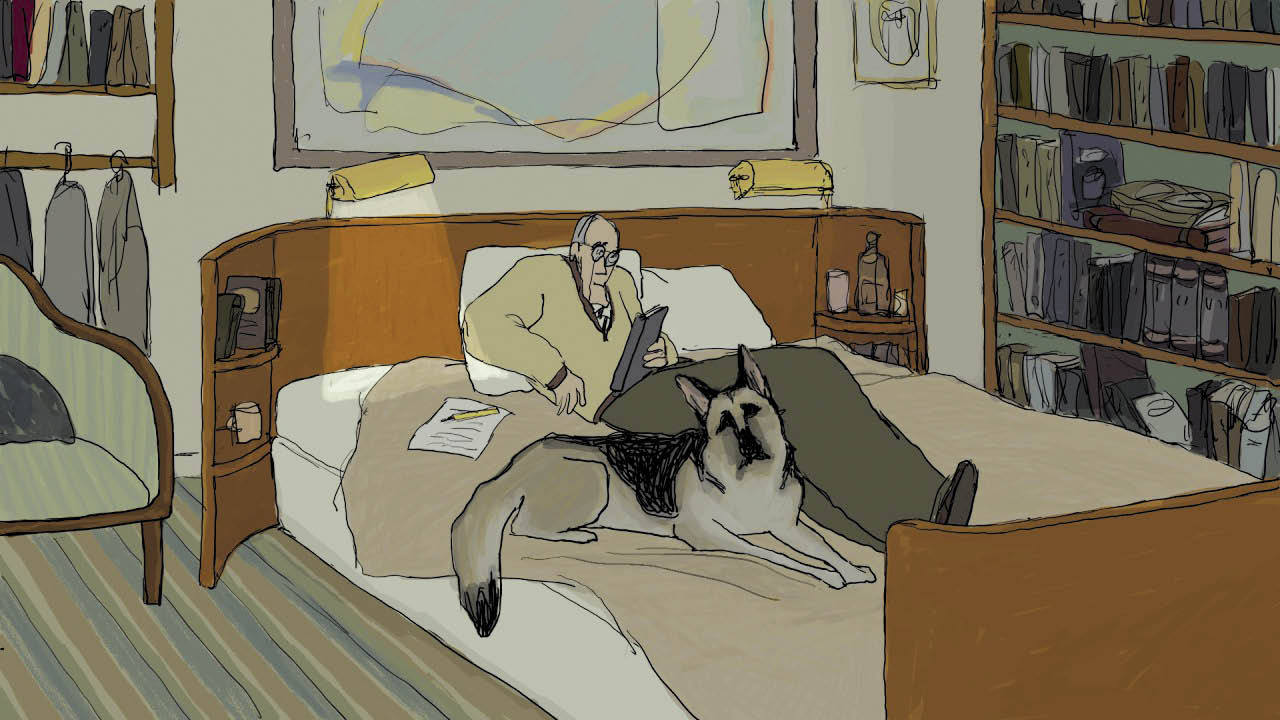My Dog Tulip is a tender and exquisite animation about one man and his dog which gets as close to what it is to love dogs as I’ve ever encountered, and goes a considerable way to making up for what dog-lovers have had to put up with at the cinema in recent years (Hotel for Dogs, Beverly Hills Chihuahua, Marley & Me; utter tripe).
My Dog Tulip is a tender and exquisite animation about one man and his dog which gets as close to what it is to love dogs as I’ve ever encountered, and goes a considerable way to making up for what dog-lovers have had to put up with at the cinema in recent years (Hotel for Dogs, Beverly Hills Chihuahua, Marley & Me; utter tripe).
This is based on the 1956 memoir by J.R. Ackerley (1896–1967), one of the great literary editors of his day (he was arts editor of the BBC magazine the Listener), and who, for 15 years, shared his small Putney flat with Tulip, an Alsatian bitch whom he observed with an awe that was rapturous but never sentimental. This film is that book, filmed, and it is charming, beautiful and supremely sophisticated; treating the human-canine relationship as the mutually beneficial marvel it is. (I took a career break to raise my dog, but he has paid me back in spades by looking funny in the yarmulke I keep for the very purpose; gets me every time.)
Ackerley was ‘quite over 50’ when he adopted Tulip, who was 18 months old and had previously been imprisoned in a small yard, although, of course, she rescues him as much as anything. Ackerley was openly gay at a time when it was difficult to be openly gay, or gay at all, and Tulip became the ‘ideal friend’ he’d always yearned for. His prose is sublime — ‘She offered me what I never found in humans: constant, single-hearted, incorruptible, uncritical devotion, which is the nature of dogs to offer’ — and provides the film’s narrative voiceover, as read by Christopher Plummer, who is superb. His voice is so richly meditative it’s the sort of voice you want to melt into and never emerge from. Someone at the door? Clear off. I’ve melted into Christopher Plummer’s voice, and I’m not coming out for anybody!
Directed and animated by husband and wife team Paul and Sandra Fierlinger, for whom this was obviously a labour of love, the visuals mesh with the words perfectly and capture all the various moods, from melancholy and autumnal, to comic and skittish. The film comprises nearly 60,000 drawings hand-drawn digitally (that is, on to a computer), and are just so lovely, like the best ever watercolours come to life.
Tulip has her foibles. Tulip can be flirtatious one minute and fiercely possessive the next. Tulip can be infuriating. Tulip sometimes earns herself a biff on the nose. But, all the while, Ackerley marvels at her every detail, rhapsodising not just about her beauty and constancy, but also her defecations and urinations. There isn’t a bit of Tulip he doesn’t find fascinating, or isn’t curious about. Occasionally, the animation leeches into black and white pencil sketches where Tulip appears half human wearing a little skirt and holding court. This seems horribly anthropomorphic, and I suppose it is, but it so beautifully embraces Tulip’s spirit, it adds and does not detract.
The pair have their adventures — a visit to Captain Pugh who had served with Ackerley in the first world war is both sad and funny — and encounter various characters along the way. There is Ackerley’s sister, Nancy (Lynn Redgrave, in her final performance), who vies for Tulip’s affection, and the wonderfully insightful vet, Mrs Canvenini (Isabella Rossellini), who instantly figures out why Tulip attempted to bite all previous vets. ‘You’re the trouble,’ she tells Ackerley. ‘She’s in love with you.’
The film, like the book, does not directly address Ackerley’s loneliness and homosexuality and childlessness, but it is there in the chinks, and no more so than in Ackerley’s determination to see Tulip ‘married’ and have babies. Ackerley is unabashed about what this involves. The anatomical changes that occur when a bitch is on heat are investigated fully. Tulip is sometimes helped along with a little Vaseline. She is good at seeing off the paramours she does not fancy (by snarling them into a corner, mostly; don’t knock it till you’ve tried it; it is fantastically effective). And there is plenty of mounting. This is not a children’s film. It is an adult film told from an adult sensibility, and it is a fully grown-up love story.
It’s marvellous, probably the best dog-flick you are ever going to see, based on the best dog-lit you are ever going to read. What more can I say? I’ll hand you over to my dog. What do you think, Monty? ‘Woof!’ Dogs are constant, single-hearted, incorruptible, uncritical and look funny in yarmulkes, but rarely have anything sensible to say about film. It may be their one shortcoming.






Comments